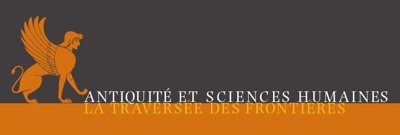
ISSN 2466-5916
Method of peer review
double-blind undertaken by a specialist member of the Board or an external specialist
Keywords
Antiquity, Cultural studies, Historical anthropology, Ancient Rome, Ancient Greece, Social history, Classics, Literature, Religion, Material culture
Accepted Language(s):
German, English, French, Italian
Accepts Contributions in Open Access
À partir des années 1950, les recherches portant sur l’Antiquité, qu’on l’appelle “classique” ou non, associent de plus en plus à leur démarche les méthodes et les apports de l’anthropologie.
Dans ce contexte, l’étude des sociétés anciennes se construit le plus souvent dans un rapport à cet objet qui repose tantôt sur le registre du proche, tantôt sur celui du lointain. D’un côté, par un lien de proximité jamais rompu, nous serions les héritiers des Anciens qui nous auraient transmis pour étude, et comme legs, des institutions politiques, des valeurs morales, des codes esthétiques, des conceptions de l’autre, des modes de pensée, des manières d’agir, de donner, de souffrir, d’aimer. D’un autre côté, les Anciens seraient toujours à distance, dans le lointain, parce que nous sommes séparés de leurs expériences non seulement par un écart temporel qui tient du temps long, mais aussi par un ensemble de ruptures, “renaissances” ou “redécouvertes”, qui nous font appréhender les Grecs, les Romains et ceux avec lesquels ils sont entrés en contact comme profondément autres. À ce lointain imposé par les conditions historiques s’ajoute la mise à distance opérée par le savant vis-à-vis de son objet, de manière à mieux en dégager la singularité. Le questionnement anthropologique est, en lui-même, porteur d’un “regard éloigné”.
L’objet de cette collection est de tracer le cheminement d’une nouvelle anthropologie de l’Antiquité, en devenir, et de formuler quelques-unes des questions qu’elle permet de poser, dans des domaines précisément circonscrits, de manière à renouveler à la fois les approches et les connaissances.
* * *
From the 1950s onward, scholarly research on “Classical” Antiquity has increasingly drawn on anthropological methods and contributions.
In this context, the study of ancient societies is most often construed in a relationship to its object resting sometimes on the discourse of the proximate, sometimes on that of the distant. On the one hand, through an unbroken line of proximity, we would be the heirs of the Ancients, who transmitted to us, for study and as a legacy, their political institutions, moral values, aesthetic codes, conceptions of the other, modes of thinking, ways of acting, giving, suffering, and loving. On the other hand, the Ancients would invariably remain at a distance, in the remote past; we would be separated from their experiences not only by a great expanse of time, but also by a distinct set of ruptures, “rebirths”, or “rediscoveries”, making us appreciate the ancient Greeks, the Romans, and those with whom they have been in contact, as profoundly different. This gap, imposed by the historical conditions, is compounded by the operational distance between scholar and object, bringing into relief the latter’s singular nature. Indeed, the anthropological approach in its own right carries a “distant gaze”.
This collection seeks to open up avenues for a novel and emerging anthropology of Antiquity, and to set an agenda of questions, in precisely defined areas, to develop new approaches and expand the knowledge resulting from them.
-
EDITORIAL BOARD
DIRECTEURS DE COLLECTION
Corinne Bonnet, Scuola Normale Superiore, Pisa
Frederik Vervaet, The University of Melbourne
COMITÉ SCIENTIFIQUE
Zainab Bahrani, Columbia University, New York
Nicola Cusumano, Università degli Studi di Palermo
Erich Gruen, University of California, Berkeley
Nicholas Purcell, St John’s College, Oxford
Aloys Winterling, Humboldt Universität, Berlin
-
AUTHOR INFORMATION
Consignes éditoriales à appliquer pour la collection ASH :
https://www.brepols.net/permalink/guidelines-ash